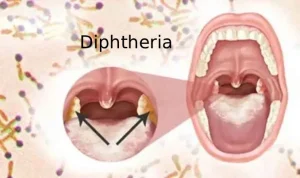Overview
Diagnosis
Doctors may suspect diphtheria in a person, particularly a child, who has a sore throat with a thick gray membrane covering the tonsils and throat. The diagnosis is confirmed when the bacterium Corynebacterium diphtheriae is found in a laboratory culture taken from the throat membrane.
In some cases, a tissue sample from an infected wound is tested in the lab to identify cutaneous diphtheria, a form that affects the skin. Because diphtheria can progress quickly and become life-threatening, doctors usually begin treatment immediately if the disease is suspected, even before lab results are available.
Treatment
Diphtheria is a medical emergency that requires prompt and aggressive treatment. The first priority for doctors is to ensure that the airway remains open, as throat swelling can obstruct breathing. In severe cases, a breathing tube may be inserted until inflammation subsides.
Main treatments for diphtheria include:
-
Antibiotics: Medications such as penicillin or erythromycin are used to kill the bacteria, stop the infection from spreading, and reduce the contagious period.
-
Antitoxin: If diphtheria is suspected, doctors request a special antitoxin medication that neutralizes the toxin produced by C. diphtheriae. This antitoxin is given by injection into a vein or muscle and is supplied by the Centers for Disease Control and Prevention (CDC).
Before administering the antitoxin, doctors perform a skin allergy test to check for potential allergic reactions. If the patient is allergic, alternative treatment strategies may be required.
Patients with diphtheria are typically hospitalized for close monitoring and isolation, often in an intensive care unit, since the disease spreads easily to those who are not vaccinated.
Preventive Treatments
Anyone exposed to diphtheria should see a healthcare provider immediately for testing and possible preventive treatment. Preventive measures may include:
-
Antibiotics to reduce the risk of developing the disease
-
A booster dose of the diphtheria vaccine if vaccination is not current
Carriers of diphtheria, even without symptoms, are treated with antibiotics to eliminate the bacteria from their system.
Self Care
Recovery from diphtheria requires rest and careful management at home once the infection is controlled. Adequate bed rest is essential, especially if the heart has been affected. A soft or liquid diet may be recommended due to throat pain and difficulty swallowing.
Isolation is necessary while the infection remains contagious to prevent spreading it to others. Frequent and thorough handwashing by all household members helps limit transmission.
Even after recovery, patients should receive a full course of the diphtheria vaccine to ensure long-term protection, as natural infection does not provide lifelong immunity.
Preparing for a Medical Appointment
If you suspect diphtheria or have been in contact with someone infected, contact your doctor immediately. Depending on your symptoms and vaccination status, you may be advised to visit an emergency room or call your local emergency number.
Before your appointment, it’s helpful to prepare the following:
-
Any instructions from your doctor about isolation or pre-visit precautions
-
A list of your symptoms and how long you’ve had them
-
Details about recent travel or possible exposure to infection
-
Your vaccination records
-
Information about your current medications and medical history
-
Questions you’d like to ask your doctor about diphtheria
Common Questions to Ask the Doctor
-
What is causing my symptoms?
-
What tests will confirm diphtheria?
-
What treatment options are available?
-
What are the possible side effects of the prescribed medications?
-
How long will it take to recover?
-
Are there any long-term complications?
-
How contagious am I, and how can I prevent spreading the disease?
What to Expect from Your Doctor
During the consultation, your doctor may ask questions such as:
-
When did your symptoms begin?
-
Are you experiencing a sore throat, breathing difficulty, or fever?
-
Have you been around anyone diagnosed with diphtheria?
-
Have you traveled recently, and if so, where?
-
Are your vaccinations current?
-
Do you have any other existing medical conditions or ongoing treatments?
Early detection and treatment of diphtheria are vital to prevent serious complications and ensure a full recovery.
Advertisement

